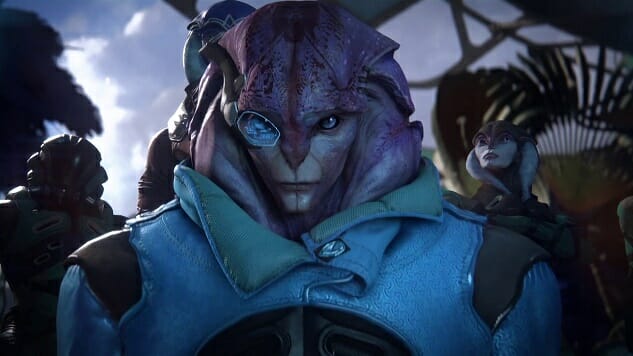Mass Effect: Andromeda—Lost in Space
It's Less a Game Than a Black Hole

The enemies in BioWare’s Mass Effect: Andromeda worship science. The kett are an alien species of bone-encrusted bug men, violent and duplicitous, who maintain control over their home galaxy under the direction of a towering leader known as the Archon. Exploring their bases to better understand how to combat their seemingly endless forces, the player is struck by the organic geometry and mucosal sheen of their work stations and research quarters. Like a gentler version of a Giger painting, the kett’s world is one whose appearance instantly communicates a technological sophistication so advanced it has nearly merged with the natural.
At one point, a recording of the Archon’s voice sneers “Biology has no use for poetry” from a terminal within a kett facility where specimens of other aliens are being evaluated by the eugenical commander. It’s the kind of mustache-twirling (tentacle-twirling?) villainy that defines Andromeda’s broad-brush approach to morality. It’s also, like much of the game’s writing, complete nonsense—a statement that contradicts the message implied by everything else the player is seeing all around her at the time. The synthesis of logic and chaos represented by the kett’s technology doesn’t square with the ideology they espouse. In their world, and in all of Andromeda’s design, there’s a profound confusion about the ways in which systemic and spontaneous thinking might coexist. There’s poetry in the game’s science, but only very rarely.
This isn’t a fault of Andromeda’s premise. Ryder, a player-created character, leads a coalition of Milky Way species on their mission to “discover” the (already inhabited) Andromeda galaxy. She is the de facto leader of the Andromeda Initiative—humanity’s representative and apparently the only person capable of getting shit done among thousands of emigrants. Partially, her outsized role is the result of problems on the deep space flight to Andromeda having resulted in Initiative vessels being scattered upon arrival, every homesteading ship but the human’s lost in some far flung corner of the galaxy. More so, Ryder’s leadership comes down to the fact that she is the player’s avatar and, in true role-playing tradition, the center of even the most expansive universe.
The enormous responsibility foisted upon Ryder works well as a set-up for the story to come. It provides an excuse for the involved detective work of meeting planetary leaders and helping to solve their problems, finding suitable locations to install outposts for the Initiative’s population to live in, and trying to understand the source of the kett’s antagonism and the nature of the strange robotic Remnant who mutely populate Andromeda. It’s a power fantasy that rationalizes itself when Andromeda sticks to its central plot, but one that falls flat when the game begins to introduce a numbing flood of trivial objectives.
It’s expected now that role-playing and open world games will bulk out their main story with side activities: typically ancillary scenes and objectives that serve to offer non-crucial narrative context and opportunities to strengthen player characters beyond what’s required to finish the primary plot. In their best instances, side missions function like interactive appendices, offering extra detail for those with a real desire to learn everything possible about a game’s fiction or combat systems. In the worst, they obscure theme, purpose or pace, distracting from an intended experience and mood to pad out a runtime or tick the “Player Freedom” feature checkbox modern games demand. Andromeda takes the latter approach, miring a straightforward story of first contact with alien species in a self-made, directionless potpourri of time-wasting distraction.
While it seems important to learn more about the varied cultures of the galaxy’s planets or to spend time getting to know Ryder’s crew—a ragtag group of fellow soldiers that includes a grumpy, battle-hardened grandpa from the toad-like krogan species and a flighty, manic pixie alien girl from the typically sagelike, psychically-gifted asari—Andromeda mixes these in with a tidal wave of excruciating minutiae. The worst, labeled “Tasks” in a menu screen that makes no effort to disguise that it’s an almost infinitely expanding list of chores, involve brain-melters like using Ryder’s computer bracelet to trace glowing lines from one area to another or travelling great distances and multiple loading screens to, say, find a corpse, then talk to someone about the corpse, run to scan for corpse-related clues, report on the corpse clues, talk to more people about the corpse, travel other places and finally offer the evidence to another party.
-

-

-

-

-

-

-

-

-

-

-

-

-

-

-

-

-

-

-

-

-

-

-

-

-

-

-

-

-

-

-

-

-

-

-

-

-

-

-

-










































